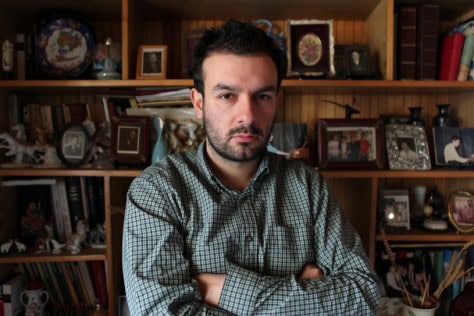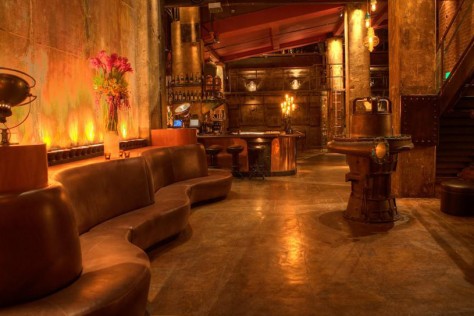Mister Lonely, Harmony Korine's new feature film breaking an eight-year hiatus, is both a radical departure from his previous movies and a logical next step for an artist who has built a career and personal reputation upon taking ultra-extreme, even physically dangerous, creative risks. After Larry Clark invited the twenty-one year old Korine to write KIDS, fresh out of NYU film school, Korine went on to direct two shining, shocking features, Gummo and Julien Donkey Boy, both of which conveyed angst and dread with astonishing combinations of delicacy, humor, and punk rebellion. Mister Lonely focuses on his own tweaked versions of hope and renewal. In it, the story of a Michael Jackson look-a-like (Diego Luna) relocating from Paris to a commune for celebrity impersonators is interwoven with a tale of Peruvian nuns who skydive sans parachute to test their faith (under the tutelage of Werner Herzog.) Two equally far-fetched narratives combine into a surreal feature that, despite a fewmorbid scenes, is eerily lovely.
Anthem spoke with Korine in New York about destruction, hope, carnivals, and how he might just shoot his next feature on a camera phone.
There's some reconciliation in Mister Lonely that happens between the different parts of the self—it's about patching together one's schizophrenic sides. Michael Jackson is more successful in unifying his two sides than Julien in Julien Donkey Boy. Mister Lonely is less about self-destruction. Can you comment on this?
I've always been attracted to marginalized characters: tramps and vagrants, outcasts and dreamers, people that have been pushed out. People that invent their own language, and their own sense of what’s right and wrong. I understand Michael’s plight, to live in one of the most beautiful places in the world without being able to speak the language, feeling alien and disconnected [in Paris.] The movies reflect my mental state at the time I'm making them, which is difficult to articulate. It’s a kind of feeling.
In all your films, characters seem to serve as prisms or mirrors to reflect your mental state. Is character building the main thing that attracts you to making films? The idea that characters can be facets of the artist?
I make movies ‘cause that’s all I ever wanted to do. Nobody else gives me what I want to see, so I just make it myself. I try to work from intuitive and lyrical places. If I could express it in words, or it was something I could talk away, I would never feel the need to make it. Sometimes I see myself making shit up just to make people happy. But in truth, I don’t really know. It just feels right. I make films because I feel like I have to. That’s part of the reason I stopped making them for so long. I wasn’t necessarily equipped with that buffer to deal with everything that went before and after the actual part of directing. But I make films because I want people to react, to see them and to be moved or confused by them.
Watching the impersonators in Mister Lonely, one immediately thinks of identity shift as transgression. You've always played with this. Do you think of identity changing as a revolutionary act, or rather, is altering one's identity revolutionary?
I guess it could be. But I think of it in simpler terms. I like people who invent their own reality. When what’s in front of them isn’t enough, they just create it. I always wanted to be someone who lived lots of lives. Like, sure, I'll make movies today, but I bet I'll be doing something else in ten years. I never understood why anyone says, This is what I am forever. I want to get into as many situations, and get into as much trouble, and invent as much stuff as I possibly can while I'm here. I want to destroy as much shit, blow it up, love it, eat it, vomit it—it's all part of it.
Traveling, and adapting to foreign cultures, really makes one question if identity can ever be fixed. What's left when everything you thought you knew about yourself crumbles away? Considering you filmed in that remote Scottish castle, and in the Peruvian jungle, do you find that traveling or going into culture shock helps you build multi-layered characters?
Everything is somewhat experiential. It all comes from the observed, even the imaginary. I just like stories, and people. I look in some window and I see a woman with curlers in hair and boxing gloves, punching stuff, and I start to imagine what her house is like, what her kids look like. Does her husband make love to her at night? Do they wear socks? Things just come from there.
As a kid, I spent time at carnivals and circuses. My dad was making documentaries on moonshiners and carnies and stuff like that. And in some ways, those were the greatest times in my life. I told him the other day that, somehow, when I make movies or anything else, I’m always trying to get back to that feeling of chaos, of craziness, that distinctly American carnival feeling. I always want to go back to the carnival.
Because of that magical possibility? Your work straddles some strange line between realism and fantasy—do you think of your work as realistic or fantastic?
Both. It's the real world slightly tweaked. That’s always the world that I live in.
The sense of time in Mister Lonely is dictated by the two stories happening both simultaneously and separately, which adds magic. In your previous films, you flashed still photos to compress time, whereas in this film, time is really extended. The people living in the commune, as well as the nuns, deliberately slow time down, or at least live outside of it.
Time is important to me. I always feel like you should slow everything down. Life moves either too quickly or too slowly. But I like films that exist in their own time and their own place. I never like anything to tie characters down to this area, place, or world. I like the idea of them just existing on their own, so people don’t bring in their preconceived notions of location or what the characters' accents should be. Maybe that's more about myth.
Even the soundtrack adds this fairy-tale quality to Mister Lonely. Did Sun City Girls and Jason Spaceman do all the composing after the film was shot?
They did it during and after, but always alongside the picture. One or two things were done to picture, but mostly they read the script and I'd tell them what it was going to look like. I liked the idea of them creating on their own, then sending sound to me.
One of the main threads throughout your work is spontaneity. In your past films, you conveyed spontaneity formally, using stills, manually cutting film. Mister Lonely is more traditionally constructed, less damaged, but the spontaneity lies in the far-fetched narrative.
That’s an interesting point. I felt Mister Lonely didn't aesthetically need to be deconstructed or broken down; the story and its subject are insane enough! I just wanted to make beautiful images, to not fight them. I deliberately didn't decontextualize, degrade, breakdown, deconstruct. It was more like, Lets go with the images in front of us.
This isn't first time you've shot on film, but don’t you usually mix film and video?
I've shot on everything. Gummo was everything, mostly 35. I have no kinship or overriding sense of format that I'm in love with. I might make my next film on a camera phone. I don’t really care, it's all just different modes of documentation, technology. Video, HD, Super-8, still photo, everything comes with its own personality, texture, feel. I kind of improvise. I shot Mister Lonely on film because I thought it was more classic, more romantic with the color and all.
Color is key. Julien Donkey Boy is golden, and Gummo is green with a heavy southern summer atmosphere. Mister Lonely is an interesting combination of blue sky, green jungle, and decrepit gray, with the clouds and castle.
Lot of yellows, blues, and greens. It made sense with the story. In the jungle and even in the commune, there would be this lushness. I wanted things to pop.
You create contrast with light and color. High contrast is a good way to reflect the manic states of characters. Also, regarding Mister Lonely's nun narrative, were you formally and aesthetically playing with contrast to connote the faith theme too?
Sure. I debated while writing whether or not my brother and I were talking about two separate movies. Maybe they don’t need to intersect, maybe one is enough. I knew combining the stories would be controversial—there's always that audience that hates tampered-with narratives. But I finally decided that these two stories were the same idea dancing together, that they commented on one another. To mash together the ideas of faith and of wanting to be other that who you are, of creating your own reality and living in it, took a narrative stance with poetic punctuation. There is an inherit drama that exists in that. People who are dreamers, and who are very pure of heart, at least for a time, are the most vulnerable. They're the easiest to hurt.
The interesting thing about faith is the impossibility of knowing if what you believe in exists. It goes back to unattainability.
That’s true, and also the transcendence. To say that, in this world, rules aren’t enough. Like, I can ride a bicycle out of an airplane without a parachute and I can do bunny hops in the sky, and somehow because I believe enough, I'll make it. I'll survive. I'll ride away. I love that. Obviously, there’s something scary about fanaticism on any level, but I always thought it was beautiful as well. The idea that people can defy logic or science. That they believe in or love so strongly what they believe, nothing else breaks their attention. I don’t know if I've ever believed in something like that.
I often wish I could negate my critical mind, this logical veil I've constructed to tell myself that something can’t happen. But isn't that what the process of art making is about, trying to erase the self-critique in order to make what you want to make? In each of your films, there's one character that has a teeny bit more faith compared to others who are completely nihilistic or fucked up. That’s where the ironic humor reveals itself.
Well, it’s humor, but also, I would hate the idea of making movies that are bleak with no sense of hope. You could argue that Julien Donkey Boy ends on a pretty destroyed moment, but in Mister Lonely, there's more a sense of wonderment, craziness, and poetry. I would like to express some sense of hope. But at the same time, what the fuck do I know. It's good to make people laugh!
You’ve said that you see images in your mind and then build around them. Do you listen to music to conjure those images?
Mostly they come from driving around in my car. There are certain streets I drive up and down, because there’s so much going on in backyards and shop windows. Sometimes, that’s where it all comes from.
In your past films, people set the atmosphere. In Mister Lonely, there are so many more landscape shots. Nature plays a bigger role now. Has wilderness changed your life at all?
Definitely. It’s just something that happened after leaving the city. I live where I have a yard full of trees, and I can actually see plants grow. I don't feel too involved in anything urban. I mean, cities are fine, but they’re not so interesting to me at this moment.
 Q&A with Larry Gus
Q&A with Larry Gus We Own the Night: The Edison
We Own the Night: The Edison
No Comments